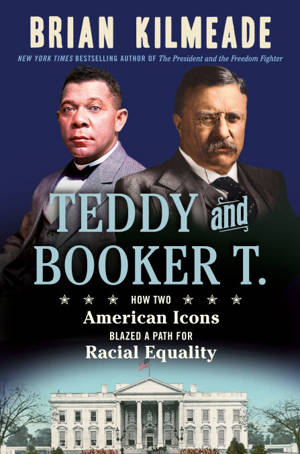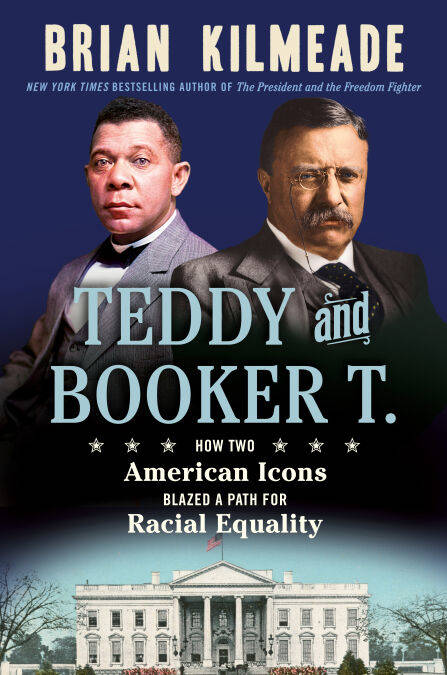
- Afhalen na 1 uur in een winkel met voorraad
- Gratis thuislevering in België vanaf € 30
- Ruim aanbod met 7 miljoen producten
- Afhalen na 1 uur in een winkel met voorraad
- Gratis thuislevering in België vanaf € 30
- Ruim aanbod met 7 miljoen producten
Zoeken
Teddy and Booker T. E-BOOK
How Two American Icons Blazed a Path for Racial Equality
Brian Kilmeade
E-book | Engels
€ 5,77
+ 5 punten
Uitvoering
Omschrijving
The New York Times bestselling author of George Washington's Secret Six and Thomas Jefferson and the Tripoli Pirates turns to two other heroes of the nation: Theodore Roosevelt and Booker T. Washington.
When President Theodore Roosevelt welcomed the country’s most visible Black man, Booker T. Washington, into his circle of counselors in 1901, the two confronted a shocking and violent wave of racist outrage. In the previous decade, Jim Crow laws had legalized discrimination in the South, eroding social and economic gains for former slaves. Lynching was on the rise, and Black Americans faced new barriers to voting. Slavery had been abolished, but if newly freed citizens were condemned to lives as share croppers, how much improvement would their lives really see? In Teddy and Booker T., Brian Kilmeade tells the story of how two wildly different Americans faced the challenge of keeping America moving toward the promise of the Emancipation Proclamation.
Theodore Roosevelt was white, born into incredible wealth and privilege in New York City. Booker T. Washington was Black, born on a plantation without even a last name. But both men embodied the rugged, pioneering spirit of America. Kilmeade takes us to San Juan Hill, where Roosevelt led his Rough Riders to a thrilling victory that set the stage for a legendary presidency, and to a small town in Alabama, where Washington founded the first university for African Americans, paving the way for the Civil Rights Movement. Both men abhorred the decadence and moral rot the nation had fallen into, believed that improvement through careful collaboration was possible, and trusted that the American ideals of individual liberty and hard work could propel the neediest toward success, if only those holding them back would step aside.
As he did in George Washington's Secret Six, Kilmeade has transformed this nearly forgotten slice of history into a dramatic story that will keep you turning the pages to find out how these two heroes, through their principles and courage, not only changed each other, but helped lay the groundwork for true equality.
When President Theodore Roosevelt welcomed the country’s most visible Black man, Booker T. Washington, into his circle of counselors in 1901, the two confronted a shocking and violent wave of racist outrage. In the previous decade, Jim Crow laws had legalized discrimination in the South, eroding social and economic gains for former slaves. Lynching was on the rise, and Black Americans faced new barriers to voting. Slavery had been abolished, but if newly freed citizens were condemned to lives as share croppers, how much improvement would their lives really see? In Teddy and Booker T., Brian Kilmeade tells the story of how two wildly different Americans faced the challenge of keeping America moving toward the promise of the Emancipation Proclamation.
Theodore Roosevelt was white, born into incredible wealth and privilege in New York City. Booker T. Washington was Black, born on a plantation without even a last name. But both men embodied the rugged, pioneering spirit of America. Kilmeade takes us to San Juan Hill, where Roosevelt led his Rough Riders to a thrilling victory that set the stage for a legendary presidency, and to a small town in Alabama, where Washington founded the first university for African Americans, paving the way for the Civil Rights Movement. Both men abhorred the decadence and moral rot the nation had fallen into, believed that improvement through careful collaboration was possible, and trusted that the American ideals of individual liberty and hard work could propel the neediest toward success, if only those holding them back would step aside.
As he did in George Washington's Secret Six, Kilmeade has transformed this nearly forgotten slice of history into a dramatic story that will keep you turning the pages to find out how these two heroes, through their principles and courage, not only changed each other, but helped lay the groundwork for true equality.
Specificaties
Betrokkenen
- Auteur(s):
- Uitgeverij:
Inhoud
- Aantal bladzijden:
- 368
- Taal:
- Engels
Eigenschappen
- Productcode (EAN):
- 9780593543832
- Verschijningsdatum:
- 6/11/2023
- Uitvoering:
- E-book
- Beveiligd met:
- Adobe DRM
- Formaat:
- ePub

Alleen bij Standaard Boekhandel
+ 5 punten op je klantenkaart van Standaard Boekhandel
Beoordelingen
We publiceren alleen reviews die voldoen aan de voorwaarden voor reviews. Bekijk onze voorwaarden voor reviews.








